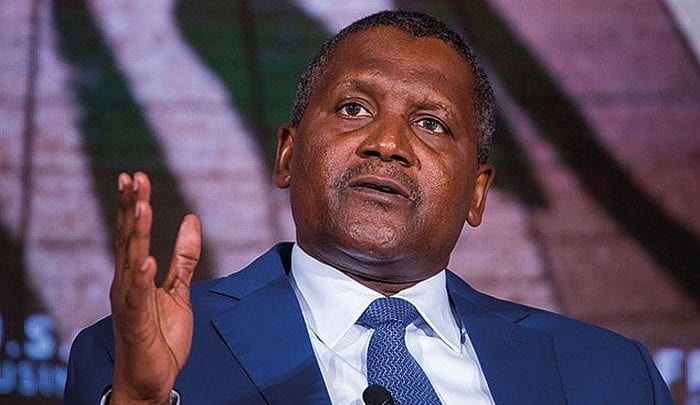
Dangote Refinery is currently battling to stay afloat amidst failure to secure Letters of Credit(LC).
Politics Nigeria has gathered that the Refinery owned by Africa’s richest man, Alhaji Aliko Dangote needs at least $3 Billion working capital to secure crude feedstock supply.
It can be recalled that Dangote has been in a running battle with Petroleum Authorities in Nigeria over their refusal to stop issuing fuel importation licenses and the quality of product produced by his refinery.
According to Reuters, BP, Trafigura, and Vitol had discussions with Dangote earlier this year in Lagos and London to negotiate loans amounting to $3 billion.
However, despite the oil traders proposing that the loans be repaid through fuel exports, no agreements have been finalized yet. Dangote has also explored options with state-backed firms for financial support, but no results have achieved.
Refineries typically have considerable working capital demands, which create a substantial drain on liquidity. Moreover, due to the misalignment between crude payment schedules and customer payments for products, intra-month fluctuations in working capital requirements can be significant.
Difficulty acquiring Letters of Credit
A Letter of Credit is a financial agreement between a bank, its customer, and a beneficiary, often issued by the importer’s bank to ensure the beneficiary receives payment once all conditions are fulfilled.
Dangote Refinery is facing challenges due to currency weakness and limited access to U.S. dollars, which have complicated efforts to secure Letters of Credit (LCs) necessary for funding crude oil purchases. Due to these difficulties, the refinery has tried to barter refined products in exchange for crude oil.
However, this approach has been rejected by some suppliers, causing delays in crude deliveries to the refinery due to alleged payment disputes.
For instance, two tankers carrying WTI Midland crude oil reportedly had to wait over a month before offloading at the refinery in May. Chinese supplier PetroChina was said to have refused payment in refined products for its crude cargo, according to S&P Global.
Further complicating the situation, a trader noted that a ‘Domestic Crude Oil Supply Obligation’ does not impose an “absolute requirement” to supply crude to the domestic market if it is not considered commercially viable, contributing to an apparent reluctance to supply the refinery.
NUPRC/Crude Oil Supply
For the portion of feedstock that Dangote Refinery can secure domestically, sources reveal that the Nigerian government is supplying it at a margin of $0.5 per barrel. However, a contentious issue has emerged as Dangote attempts to persuade the regulator to encourage International Oil Companies (IOCs) to supply crude oil to the refinery. The challenge lies in the fact that the IOCs have limited spare capacity due to their Production Sharing Contracts (PSCs) with the Nigerian government.
The Petroleum Industry Act (PIA) operates on a “willing buyer, willing seller” principle, meaning that both parties must agree on the price, and the product must be available as stipulated in Section 109 of the PIA, which governs the National Crude Oil Requirement for refineries.
Despite these challenges, the Nigerian Upstream Petroleum Regulatory Commission (NUPRC) has managed to facilitate the supply of 29 million barrels of crude oil to the Dangote Petroleum Refinery. The NUPRC, emphasizing its commitment to enforcing Section 109 of the PIA, highlighted that it has ensured that nine refineries are supplied with crude oil, despite the challenges of low crude oil production.
Fitch Downgrade
According to S&P Global Ratings, an oil refining and marketing company is typically considered “strong” if it meets several key criteria: a large refining capacity of at least 500,000 barrels per day (bpd), ownership of at least three refineries to avoid over-reliance on a single asset, a geographically diverse asset base, a complex and value-added product mix, and downstream integration through an established midstream or retail network.
By these standards, Dangote Refinery only meets the scale criterion, as noted by a second oil trader in a conversation with MoneyCentral.
Last week, Fitch Ratings downgraded Dangote Industries Limited (DIL) due to significant liquidity challenges, financial underperformance relative to prior expectations, local currency devaluation, and the lack of secured backup funding to refinance maturing debt associated with the syndicated loan raised for the construction of Dangote Oil Refining Company (DORC).
Fitch reported that the EBITDA contribution from DORC has fallen far short of previous projections, further complicating the refinery’s financial situation. The downgrade has increased the cost of borrowing for Dangote Refinery, which is already struggling with its working capital.
Fitch also projected that the Dangote group’s consolidated EBITDA margin would drop from 33% in 2023 to 9.1% in 2024, primarily due to the low-margin refinery business, which began operations in February 2024. The 650,000 bpd Dangote Refinery will be ramping up production just as global refining margins are declining from historic highs, adding further uncertainty to the $20 billion project.
The refining industry faces shrinking margins due to new capacity additions, alongside the growing popularity of electric vehicles and LNG-fueled heavy trucks, particularly in China, the world’s largest oil importer.
